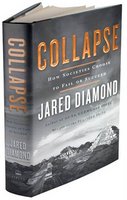
In the chapter devoted to Rwanda in Jared Diamond's book
Collapse, he explores the possibility that the tragic events that unfolded there could have been a result of over-population. His conclusion is that a basic competition for resources was among the major contributing factors in the genocide, and he sees in Rwanda a caution of what can happen when no preventative measures are taken to manage population growth. To aid him in the case Diamond calls upon Thomas Malthus, the 18th century economist whose observations led him to believe that human populations have the tendency to grow beyond the carrying capacity of their resources, at which point they are checked by either famine, disease, or war.

Diamond has no trouble qualifying Rwanda as a nation straining under the burden of its population; one with a population density even higher than developed nations, but completely lacking the import and highly mechanized farming that makes those nations sustainable, a place where farming is done by hand, with hoe, pick and machete, and each subsequent generation is allotted an increasingly small tract of land from which to eke out their existence. The undeniable picture is one of a country with too many people and too little land. The question is to what degree did these environmental pressures act as the underlying motives for the feelings of ethnic hatred that culminated in acts of genocide? For Diamond, the evidence is in, and Rwanda is a distressing model of what Malthus's worst-case scenario might look like; one in which population pressure reaches a breaking point, and manifests into the type of hatred that justifies humans wiping out other humans. If we agree to follow, and accept his brand of environmental determinism, it leads us into a strange and uncomfortable territory, where perhaps our beliefs, and the historical events that are driven by them, are not as much a product of our rational consideration as we would like.
 In the chapter devoted to Rwanda in Jared Diamond's book Collapse, he explores the possibility that the tragic events that unfolded there could have been a result of over-population. His conclusion is that a basic competition for resources was among the major contributing factors in the genocide, and he sees in Rwanda a caution of what can happen when no preventative measures are taken to manage population growth. To aid him in the case Diamond calls upon Thomas Malthus, the 18th century economist whose observations led him to believe that human populations have the tendency to grow beyond the carrying capacity of their resources, at which point they are checked by either famine, disease, or war.
In the chapter devoted to Rwanda in Jared Diamond's book Collapse, he explores the possibility that the tragic events that unfolded there could have been a result of over-population. His conclusion is that a basic competition for resources was among the major contributing factors in the genocide, and he sees in Rwanda a caution of what can happen when no preventative measures are taken to manage population growth. To aid him in the case Diamond calls upon Thomas Malthus, the 18th century economist whose observations led him to believe that human populations have the tendency to grow beyond the carrying capacity of their resources, at which point they are checked by either famine, disease, or war. Diamond has no trouble qualifying Rwanda as a nation straining under the burden of its population; one with a population density even higher than developed nations, but completely lacking the import and highly mechanized farming that makes those nations sustainable, a place where farming is done by hand, with hoe, pick and machete, and each subsequent generation is allotted an increasingly small tract of land from which to eke out their existence. The undeniable picture is one of a country with too many people and too little land. The question is to what degree did these environmental pressures act as the underlying motives for the feelings of ethnic hatred that culminated in acts of genocide? For Diamond, the evidence is in, and Rwanda is a distressing model of what Malthus's worst-case scenario might look like; one in which population pressure reaches a breaking point, and manifests into the type of hatred that justifies humans wiping out other humans. If we agree to follow, and accept his brand of environmental determinism, it leads us into a strange and uncomfortable territory, where perhaps our beliefs, and the historical events that are driven by them, are not as much a product of our rational consideration as we would like.
Diamond has no trouble qualifying Rwanda as a nation straining under the burden of its population; one with a population density even higher than developed nations, but completely lacking the import and highly mechanized farming that makes those nations sustainable, a place where farming is done by hand, with hoe, pick and machete, and each subsequent generation is allotted an increasingly small tract of land from which to eke out their existence. The undeniable picture is one of a country with too many people and too little land. The question is to what degree did these environmental pressures act as the underlying motives for the feelings of ethnic hatred that culminated in acts of genocide? For Diamond, the evidence is in, and Rwanda is a distressing model of what Malthus's worst-case scenario might look like; one in which population pressure reaches a breaking point, and manifests into the type of hatred that justifies humans wiping out other humans. If we agree to follow, and accept his brand of environmental determinism, it leads us into a strange and uncomfortable territory, where perhaps our beliefs, and the historical events that are driven by them, are not as much a product of our rational consideration as we would like.
1 comment:
Blackburn this is probably one of the most amazing things I have ever witnessed in my lifetime. I'm finding it hard to even imagine all of the adventured you're experiencing in your travels. The pictures and the descriptions, the mineshafts, gold, gorilla's. It's unbelievable. Keep it up man. You will have lived more lives than all of us combined when you're done with this trip.
Post a Comment